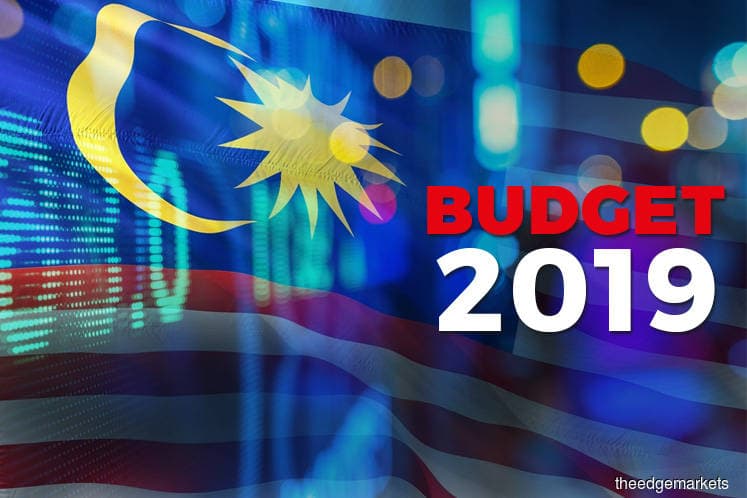
This article first appeared in The Edge Malaysia Weekly on November 5, 2018 - November 11, 2018
THE local stock market will be closely watched for its reaction to the first federal budget tabled last Friday by the Pakatan Harapan government when it opens for trading on Monday.
The Edge asked market observers and analysts how the budget’s proposals would affect the market and which companies would be hit and which would benefit. These are their comments.
The winners
According to Areca Capital Sdn Bhd CEO Danny Wong, the fiscal deficit, which is set to widen to 3.7% in 2018 and 3.4% in 2019, could raise concerns about a potential ratings downgrade, which, in turn, would put a dampener on the ringgit.
“I think a weakness in the ringgit will benefit export counters such as semiconductor and glove manufacturers,” he says over the telephone.
An analyst who covers the glove industry agrees. He says even the planned increase in the minimum wage to RM1,100 per month from Jan 1 next year is not expected to be an issue for the sector as it has largely been priced in while most of the bigger glove manufacturers, such as Top Glove Corp Bhd, Hartalega Holdings Bhd, Supermax Corp Bhd and Kossan Rubber Industries Bhd, should not have a problem with higher wages.
The absence of a tax hike is also expected to benefit tobacco company British American Tobacco (M) Bhd — the market had expected one — as is the government’s initiative to step up enforcement against cigarette smuggling.
Similarly, brewers Carlsberg Brewery Malaysia Bhd and Heineken Malaysia Bhd “escaped” further excise duties in the budget.
In the consumer space, companies such as Padini Holdings Bhd, AEON Co (M) Bhd and Apollo Food Holdings Bhd could benefit from Putrajaya’s more targeted subsidies as low-income households (B40) will get improved Bantuan Sara Hidup (BSH) cash grants, putting more disposable income in their pockets.
A fund manager with a local asset management also remarks that Cypark Resources Bhd could be a beneficiary of the green technology investment incentives. “A RM2 billion green technology financing scheme will be made available at commercial banks. This could benefit companies like Cypark Resources, which is a pioneer in and provider of integrated renewable energy and green technology.”
MyEG Services Bhd and Datasonic Group Bhd are also likely to be favoured by investors under the targeted fuel subsidy proposal as these companies could be involved in the management of the mechanism.
In 2014, Datasonic entered into an agreement to acquire a 30% stake in Fuelsubs House Sdn Bhd, then deemed the front runner for a targeted fuel subsidy scheme management job worth RM10 million. At the time, it was reported that Tan Sri Syed Mokhtar Albukhary’s Pos Malaysia Bhd could form a joint venture with Datasonic and Fuelsubs for the project. However, the deals did not materialise.
Rakuten Trade Sdn Bhd head of research Kenny Yee, however, thinks MyEG has a better chance of getting the job, given its better and wider database. “Nonetheless, it’s still too early to tell now because we don’t know how the government will implement the project,” he says.
The losers
As for the losers, Yee cites the casino operators — Genting Bhd and Genting Malaysia Bhd are two that are locally listed — as the most affected by the budget.
The gaming sector has not seen a tax, fee or levy increase since 2005 but under Budget 2019, casino licence fees have been bumped up from RM120 million to RM150 million per annum while casino duties have been hiked up to 35% of gross collection.
Investors in number forecast operators, such as Magnum Bhd and Berjaya Sports Toto Bhd, are also likely to be unhappy as the government has announced a 50% reduction in the number of special draws.
However, it is worth noting that most of the research houses had already priced in the potential of fewer special draws next year based on some of the reports that were issued leading up to the announcement of the budget.
The introduction of a soda tax will not be sweet news to beverage players even though it was not surprising, given that the government had hinted at it. Companies that could be affected include Fraser & Neave Holdings Bhd (F&N), Nestlé (M) Bhd and Berjaya Food Bhd because of its exposure to Starbucks.
An analyst with a local asset management company, who asked not to be named as he is not the spokesperson, says local sugar refiner MSM Malaysia Holdings Bhd could also be impacted by the soda tax. “If you look at the government’s intention when it introduced a soda tax, it’s obvious that the focus is on helping Malaysians choose a better diet by reducing their sugar intake. Most likely, we’ll see companies that are involved in the beverages business reduce their sugar level to avoid the duty. This will lead to weaker demand for sugar, which will ultimately hurt MSM.”
Another analyst shares that logistics players could also be affected by higher costs because petrol subsidies will be more targeted. Vulnerable companies include Pos Malaysia and GD Express Carrier Bhd. They are also trading at high valuations with trailing price-earnings ratios of 38.9 and 86.1 times respectively.
A proposal to impose a departure levy on all outbound air travellers from June 1 next year could impact AirAsia Group Bhd and AirAsia X Bhd.
Areca Capital’s Wong opines that property counters could also be hit as the secondary market will be affected by an upward revision in the Real Property Gains Tax.
Save by subscribing to us for your print and/or digital copy.
P/S: The Edge is also available on Apple's AppStore and Androids' Google Play.